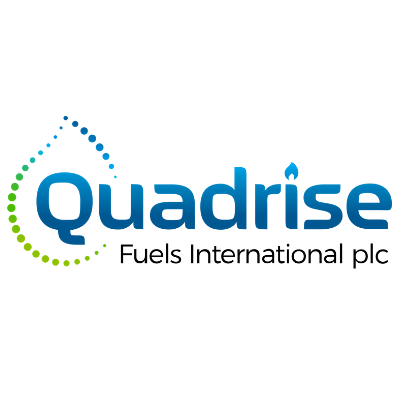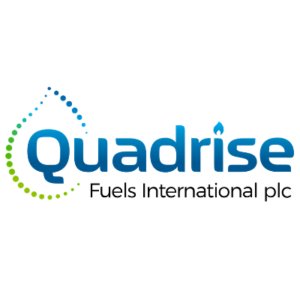Quadrise Fuels International plc (LON:QFI) Chief Executive Officer Jason Miles caught up with DirectorsTalk for an exclusive interview to discuss new Chairman Andy Morrison, the significant for bioMSAR as a transition fuel, the impact of the Aquafuel results on plans for commercialisation, other tests planned at Aquafuel, discussions with MSC, other active projects and what we can expect in the coming months.
Q1: Quadrise Fuels International have appointed a new Chairman today, can you just tell us more about Andy Morrison?
A1: We’re obviously delighted to have Andy actually join us today, it’s his first day today, following a very comprehensive recruitment process led by the Nominations Committee and Phil Snaith. We’re very sure that Andy will add significant value to the company and experience the Board.
He’s a very experienced fellow chemical engineer with some 40 years of experience, starting his career at Royal Dutch Shell where he had an international oil trading, marketing, shipping and speciality chemicals experience which captured our attention. Of particular interest to us is actually his life after Shell, the development of his career was moved to more strategic and then portfolio roles and since 2007, he’s been working with a variety of different publicly-listed smaller junior companies such as ours. His role recently in Spinnaker Acquisitions as an investor, again, cemented his experience to be very city-facing and an ideal fit really with what we are looking for from a Non-Exec Chairman.
So, yes, we are delighted and hopefully he’ll be looking forward to speaking to shareholders soon.
Q2: Now, regarding the positive results of the bioMSAR testing at Aquafuel announced Monday, can you just explain for us the significance for bioMSAR as a transition fuel?
A2: It gets a bit complicated so I’ll try and keep it a high level and not too technical.
When companies are evaluating transition fuels, there are three things that are important. There’s the fuel composition and therefore the potential reduction in greenhouse gas emissions that include obviously CO2, black soot and methane but there’s also the efficiency of the transition fuel when it’s actually used in converting the energy that’s in the fuel actually to power. Then the resulting emissions are important too so obviously CO2 is important, but also other things such as NOx emissions and smoke emissions are also important. So all of those things you need to make sure your product complies with and ideally excels at.
So, prior testing of bioMSAR at Aquafuel last year, which we published last year, indicated that with the standard settings for the Cummins engine, which is a standard two litre truck engine, that’s linked to a generator so it’s a high speed engine, not really designed for running on heavy fuels, got some very positive results. We got better efficiency, by about 3%, but it also got over 20% lower NOx so that indicated we were onto something and we repeated those tests this year, again, to confirm that those results were repeatable.
The recent round of testing really was to look at then how could we adapt the engine to more closely simulate what we expect to see on the larger engines, specifically notably the larger two stroke engines, where you are able to advance the injection of the fuel, which is important for fuel such as ours, which take a little bit longer to combust.
So what we did is we modified the engine to allow early injection, we retrofitted it with a pressure sensor so we can very closely and accurately monitor what’s happening inside the engine. What we saw was that by advancing the injection of the fuel, you’re able to increase the efficiency of the engine and that was a case with bioMSAR, It was also the case with diesel as well. However, what you also see when you increase the efficiency is that the emissions of NOx go up so efficiency goes up, so does NOx, and obviously with diesel engines, that’s a limiting factor.
What we were able to do with bioMSAR was we were able to reduce the inlet air temperature down to very low levels, which are akin to diesel, and that meant that we could achieve high efficiency, but also low NOx. Whereas with diesel, what you see is you see high efficiency but you have high NOx so you can never achieve that high efficiency, which is why the engine’s detuned.
That’s very important, that gives you lots of flexibility in an industrial application and the higher efficiency obviously reduces the cost, but it also reduces the absolute amount of CO2 that emit as well. So, if you can comply with emissions limits or even better them which we did in the recent testing, but also get that higher efficiency in the engine, that’s an extremely compelling factor which really separates the bioMSAR with other potential transition fuels.
Q3: What impact will these results have on your projects and plans for commercialisation?
A3: We certainly think that the results will support and hopefully accelerate the plans we have on the larger scale trials, which I can tell you about it in a minute. I think in terms of the non-engine applications, all of these results are very helpful to convince people that the fuel burns extremely effectively.
Q4: What can you tell us about other tests that are planned at Aquafuel?
A4: So, at Aquafuel, we weren’t able to completely do all of the runs that we needed to do to optimise efficiency versus emissions so the final bit of the testing, based on what we’ve just recently seen, is to carry out some additional tests in just to exactly quantify how much better efficiency we can achieve versus diesel and what the optimum settings is for the emissions. That will then be very helpful to feed into the other testing that we have planned.
We also have some other formulations of fuel that we are looking at as well and the Aquafuel engine can be used for that type of testing, it’s a perfect little setup we have and obviously a UK base as well so it makes life very easy logistically.
Q5: Just coming away from that, how are talks with MSC progressing and what are the next steps for vessel testing and overcoming OEM resistance?
A5: The MSC discussions of progressing well and obviously, the recent Aquafuel results are definitely supportive in progressing actually to vessel testing, what we’d like to do is go straight to vessel testing without having to wait for the stationary engines to be available from the OEMs. So it’s utilizing these results now to obviously support the step to move straight to BioMSAR testing on the vessel without having to wait for the stationary engine test to happen first.
So, those discussions are progressing and obviously we’re looking forward to updating shareholders in due course.
Q6: Jason, can you just update us on the status of your other active projects in Morocco and Utah and how the timetables are looking since you last updated to the market?
A6: Obviously January has passed by and there’s been lots of things going on.
In Morocco, we’re still working on updating the material transfer corporation agreement that we have with the client, there’s a new client team that we’re working with so we’ve been working with those guys to really get things ready to carry out site trials. Morocco has been quite tricky because until very, very recently, there’s been no means of accessing Morocco, all of the borders have been shut. That’s now been opened up as of this month, next week, so our team are able to access the site again.
So, once we have the agreements signed off and the plans finalised in terms of the testing, which we still target for this quarter, then we’ll be providing an update in due course, but work is ongoing.
Q7: What else can we expect over the next few months with regards to progress and announcements from Quadrise Fuels International?
A7: With Utah, we’re still working with TomCo and Heavy Sweet Oil as well, they’re in the middle of a down hole drilling program at the moment together so we’re working with those guys to really dovetail their production plans for down hole oil with the potential production of bioMSAR and MSAR at site for trials that we’re looking at doing there. Obviously, it’s a future supply point for bioMSAR and potentially MSAR for our future plans with MSC, once a vessel trial is ongoing, hopefully it’s completed. So, all of those things are progressing well.
In terms of the next few months, we’ve obviously got two senior appointments announced within a month of each other which will definitely assist me in some of the heavy lifting. Phil Hill’s already hit the ground running and we expect Andy to do the same so we’ve obviously got two people to bring up to speed, we’ve got lots of other things going on.
In the Americas, we have some refinery and power plant trials, which we are working on with the clients there in Mexico and Panama and also, we are working on some other new projects, looking at new aspects to the technology that we hadn’t thought about before. Also, our net zero fuel project to move bioMSAR to the next level and achieve a fuel that potentially has very compelling features compared to other blue and green type transition fuels.


